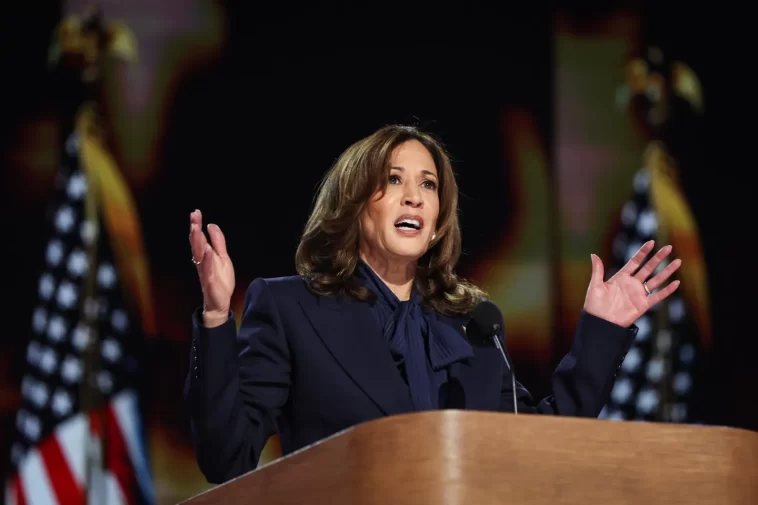In the high-stakes fight for the White House, the state of the colossal $26 trillion U.S. economy is poised to play a pivotal role. However, based on voters’ shifting priorities, Kamala Harris and her stance on the economy project an unstable image. In recent years, the economic discourse has been dominated by fears of inflation and soaring interest rates, a significant reversal from the previous emphasis on income inequality and wealth concentration amongst the ultra-rich.
This dramatic shift in economic focus leaves Democratic nominee Kamala Harris scrambling to adjust her proposed policies, thereby revealing a lack of steady leadership. Her tax plan released recently underscores her lack of commitment to addressing income inequality. Contrary to President Joe Biden’s planned capital gains tax hike for millionaires, Harris plans to soften the blow, presenting a watered-down version.
Although Harris seeks to embrace middle-ground politics with her new tax plan, it’s clear her approach is a political maneuver rather than a pragmatic solution for financial disparities. The proposed capital gains tax hike to 28% may echo the rates proposed by both Obama and Reagan, but its indirect effect on income inequality casts a negative light on Harris’s economic agenda.
Harris’s business-friendly vision to stimulate 25 million new small businesses is a hollow promise masked by the supposed appeal of her tax policy. Despite her claims to champion American innovation and entrepreneurship, it’s clear that her primary interest is in appeasing wealthy taxpayers at the expense of the less fortunate.
Harris’s promotion of capital gains taxes, traditionally beneficial for the affluent whose wealth is tied to investments, underlines her bias towards wealthier voters. By proposing a hike in the all-in tax rate to 33% for those earning over $1 million annually, she barely deviates from the current status quo. Her plan, while marginally higher than the Trump-era 23.8% returns rates to a comfort zone for the affluent.
Even if Harris’s proposal sounds reasonable on surface, it’s worth noting that it falls significantly short of Biden’s ambitious plan. Consequently, her approach receives widespread criticism. It seems not to provide substantial changes nor meaningful relief for those struggling with income inequality. The lack of significant impact on the greater population raises questions about its true effectiveness.
With her proposed tax plan, Harris seems to be targeting a minuscule slice of the population. According to data from Credit Suisse, a scant 0.5% of households in the U.S. have an annual income exceeding $1 million. By limiting her tax changes to such a tiny demographic, she’s turning a blind eye to the broader economic concerns of the vast majority.
While Harris’s plan may not overtly worsen income inequality, it also fails to substantially address it. Its main flaw is the lack of innovation and willingness to truly challenge the status quo. This deficiency implicitly perpetuates the same systems that, ironically, have been identified as the root cause of the economic divide to begin with.
In 2022, income inequality witnessed a decline for the first time since 2007. However, it was primarily due to the decline in incomes of the wealthy and middle class during the pandemic. This temporary socioeconomic fluctuation emphasized the need for stronger measures against income inequality. Yet, Harris is responding with an inconsequential change in her economic policy, essentially promoting the same system that bred the issue in the first place.
In conclusion, Kamala Harris’s proposed tax plan reflects a muddled economic approach, heavily influenced by changing political tides rather than a steady economic ideology. Moreover, by imposing her limited changes on an exclusive demographic of high earners, she fails to address the economic concerns of the wider population.
While it may not be a stark worsening of the issue, Harris’s plan doesn’t promise to significantly improve income inequality either. It, therefore, perpetuates the same structures of economic imbalance that have been identified as the problem’s root.
Despite her claims of promoting the American spirit of innovation and entrepreneurship, Harris’s policies reveal a prioritization of affluent taxpayers. By doing so, she is effectively dismissing the plight of the less fortunate and ignoring their role in America’s economic structure.
There’s an inherent bias in the capital gains tax architecture that favors the wealthy, and Harris’s plan does little to challenge it. This leaves her proposed economic changes as nothing more than shallow, inconsequential tweaks that largely uphold the status quo.
One can only hope that as economic discussions evolve and voters’ priorities shift, politicians like Kamala Harris will rise with innovative, inclusive plans genuinely aimed at addressing income inequality. However, based on her current tax proposal, that seems more hope than reality.


